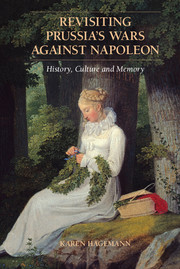Crossref Citations
This Book has been
cited by the following publications. This list is generated based on data provided by Crossref.
Aaslestad, Katherine B.
2016.
War, Demobilization and Memory.
p.
220.
Martin, Alexander M.
2016.
War, Demobilization and Memory.
p.
287.
Forrest, Alan
Hagemann, Karen
and
Rowe, Michael
2016.
War, Demobilization and Memory.
p.
3.
Painter, Cassandra
2018.
Domesticating a Mystic: Catholic Saint-Making in Weimar Germany.
Central European History,
Vol. 51,
Issue. 2,
p.
228.
Hagemann, Karen
and
Lässig, Simone
2018.
Discussion Forum: The Vanishing Nineteenth Century in European History?.
Central European History,
Vol. 51,
Issue. 4,
p.
611.
Williamson, George S.
2018.
Retracing theSattelzeit: Thoughts on the Historiography of the French Revolutionary and Napoleonic Eras.
Central European History,
Vol. 51,
Issue. 1,
p.
66.
Lecce, Giampaolo
and
Ogliari, Laura
2019.
Institutional Transplant and Cultural Proximity: Evidence from Nineteenth-Century Prussia.
The Journal of Economic History,
Vol. 79,
Issue. 4,
p.
1060.
Jones, Elizabeth B.
2019.
Seeing is believing: sites/sights of agricultural improvement in Germany (1840–1914).
Rural History,
Vol. 30,
Issue. 1,
p.
37.
Sangar, Eric
2020.
Diffusion in Franco-German Relations.
p.
9.
Reusch, Johann J. K.
2020.
Cultures of Memory in the Nineteenth Century.
p.
223.
Achtelstetter, Laura
2020.
Religion, Ethik und Politik.
p.
199.
Ilany, Ofri
2020.
Herr Zebaoth
and the German nation: bible and nationalism in the anti-Napoleonic wars
.
Global Intellectual History,
Vol. 5,
Issue. 1,
p.
104.
Sangar, Eric
2020.
Diffusion in Franco-German Relations.
p.
81.
Griffin, Patrick
2021.
Imperial Confusion: America’s Post-colonial and Post-revolutionary Empire.
The Journal of Imperial and Commonwealth History,
Vol. 49,
Issue. 3,
p.
414.
Schneeman, Eric
2021.
The Berlin Premiere of Gluck’s Iphigénie en Aulide in 1809: An Opera to Restore the Monarchy and the Nation.
Journal of War & Culture Studies,
Vol. 14,
Issue. 2,
p.
140.
Kojman, Tamar
2024.
An Awkward Predicament: “The German Man” and Feminized Modernity in the 1840s.
Central European History,
Vol. 57,
Issue. 1,
p.
1.





